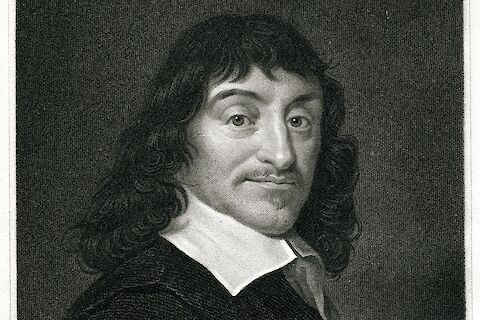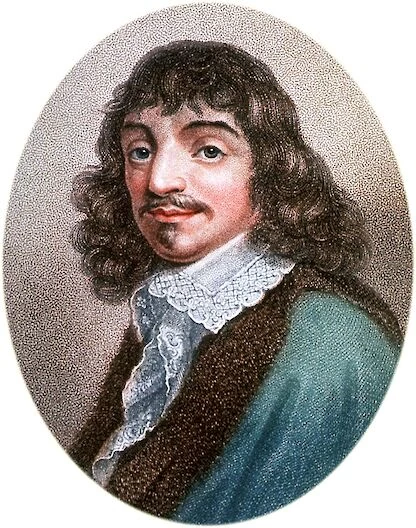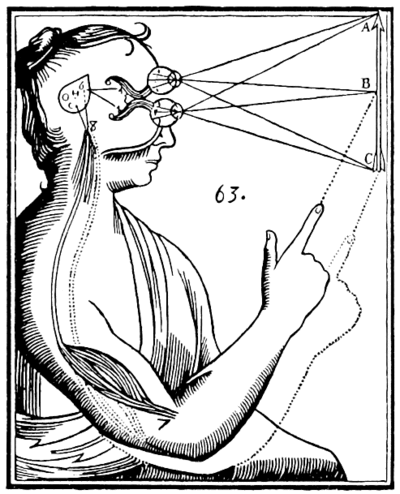

Philosophy and the afterlife
René Descartes was a French philosopher and mathematician. Born in 1596 and passing in 1650, his thoughts paved the way to an afterlife. People have many different views as to what makes a spirit or ghost. One of the more popular beliefs is that when our physical body dies, our consciousness or our mind lives on. How could this be possible? While philosophers before him talked about the concept of the soul, it was René Descartes who came up with the concept of Duality.

Image Source: https://www.britannica.com/biography/Rene-Descartes
Duality
[O]n the one hand I have a clear and distinct idea of myself, in so far as I am simply a thinking, non-extended thing [that is, a mind], and on the other hand I have a distinct idea of body, in so far as this is simply an extended, non-thinking thing. And accordingly, it is certain that I am really distinct from my body, and can exist without it
Descartes
Descartes paid particular attention to the pineal gland which he referred to as the 'Seat of the principal soul'. He believed it was the pineal gland that was the place that all of our thoughts were formed.
My view is that this gland is the principal seat of the soul, and the place in which all our thoughts are formed. The reason I believe this is that I cannot find any part of the brain, except this, which is not double. Since we see only one thing with two eyes, and hear only one voice with two ears, and in short have never more than one thought at a time, it must necessarily be the case that the impressions which enter by the two eyes or by the two ears, and so on, unite with each other in some part of the body before being considered by the soul. Now it is impossible to find any such place in the whole head except this gland; moreover it is situated in the most suitable possible place for this purpose, in the middle of all the concavities; and it is supported and surrounded by the little branches of the carotid arteries which bring the spirits into the brain.

Drawing from René Descartes' (1596-1650) in "Treatise of Man" supposing the function of the pineal gland.
René Descartes's illustration of dualism. Inputs are passed on by the sensory organs to the epiphysis in the brain and from there to the immaterial spirit.
Gilbert Ryle was a more modern-day philosopher in the 1900s that explored the works of the philosophers before him such as Descartes. His thoughts of Duality and in particular the mind-body problem have been detailed in many of his works. His most famous works is that of 'The Ghost in the Machine'.
There is a doctrine about the nature and place of the mind which is prevalent among theorists, to which most philosophers, psychologists and religious teachers subscribe with minor reservations. Although they admit certain theoretical difficulties in it, they tend to assume that these can be overcome without serious modifications being made to the architecture of the theory.... [The doctrine states that] with the doubtful exceptions of the mentally-incompetent and infants-in-arms, every human being has both a body and a mind.... The body and the mind are ordinarily harnessed together, but after the death of the body the mind may continue to exist and function.
Gilbert Ryle
Descartes on dreaming
People often report having paranormal experiences in their sleep. If our mind is separate from our body, where does our consciousness go when we are asleep? Is this state what allows us to experience something we perceive to be paranormal? Descartes, believed that the content in dreams and our waking life were virtually the same. One of the biggest connections he made here was the fact that we often believe we are having a waking life experience, only to find out later it was a dream.
But I cannot forget that, at other times I have been deceived in sleep by similar illusions; and, attentively considering those cases, I perceive so clearly that there exist no certain marks by which the state of waking can ever be distinguished from sleep, that I feel greatly astonished; and in amazement I almost persuade myself that I am now dreaming.
Descartes
How do we know what are experiencing or thinking is a dream or an act of wakefulness. Do we ever fully 'wake up?' What happens to us when we dream? There are several dream states that people associate with paranormal phenomena. From being in a hypnagogic state to receiving precognitive messages in dreams, through to lucid dreaming and sleep paralysis. In these states, people have reported what they believe to be paranormal experiences. Often the rational side of us says "it was all just a dream'" and therefore it cannot be trusted. What if Descartes however is right? We tend to believe that humans are capable of mental telepathy - transferring thought mentally from one to another. Using Descartes dream argument, if we can do it while we are awake, why not while we are asleep?
How can you be certain that your whole life is not a dream?
Descartes
While a lot of Descartes thoughts are picked apart through different interpretations as well as what seems to be some misunderstanding on his part of the anatomy of the brain, all these years later, people look to the very concept he introduced in that the mind is separate to the body. While our physical body dies, the mind lives on and this is what many within the paranormal field believe they are communicating with. You also have to wonder if it is the pineal gland that allows us a glimpse into the world as it truly may be. Is it the pineal gland that is the doorway to the other side? I have left this vague because now it is over to you. What are your thoughts?
References:
Descartes and the Pineal Gland
Stanford Encyclopedia of Philosophy
The pineal gland as physical tool of the soul faculties: A persistent historical connection - Science Direct
Descartes, the pineal soul, and brain-stem death - Britannica
If you enjoy LLIFS, consider buying me a book (otherwise known as buy me a coffee but I don't drink coffee and I LOVE books). Your donation helps to fund the LLIFS website so everyone can continue to access great paranormal content and resources for FREE!

Top pages with similar subjects
Don't forget to follow the Facebook page for regular updates
Join the mailing list to receive weekly updates of NEW articles. Never miss an article again!
Buy the latest and past issues Haunted Magazine
Check out the books written by LLIFS
Comments
-
Tom Ruffles 3 years ago
On the pineal gland, it's worth looking at the work of Serena Roney-Dougal: https://psi-encyclopedia.spr.ac.uk/articles/serena-roney-dougal